| Article ID | Journal | Published Year | Pages | File Type |
|---|---|---|---|---|
| 1723825 | Ocean & Coastal Management | 2014 | 12 Pages |
•Individual transferable quotas (ITQs) can reduce overcapacity and overfishing.•ITQs have also been criticized on rights-based and distributional grounds.•ITQs can be designed to minimize the criticisms while still achieving their goals.
Individual transferable quotas (ITQs) have reduced overcapacity and increased profitability in many fisheries, and have sometimes helped to reduce overfishing. ITQs are designed almost entirely on the basis of economic theory, however. This paper assesses ITQs from the viewpoints of four broader analytical frameworks: the interactive governance approach (IGA); the social-ecological systems (SES) framework; the ecosystems approach to fisheries (EAF); and the legal and rights-based paradigm. When viewed from these perspectives, ITQs are seen to involve several real and potential problems. These problems include concentration of ownership and the loss of SSFs; failure to make use of non-economic modes of governance; risk of ecological damage and overexploitation, and unfairness to the public as the owner of the fish.Nevertheless, ITQ schemes can be modified in ways that reduce the potential negative impacts while still retaining the structure and economic advantages. This paper describes four possible changes: reserving quota share for traditional fisheries and/or SSFs; explicitly imposing a duty of stewardship on quota holders; implementing fees or royalties rather than granting ITQs for free; and cooperative regulation. For each proposed change, the problems and weaknesses which it addresses are identified, and the potential effectiveness of the solution is discussed.
